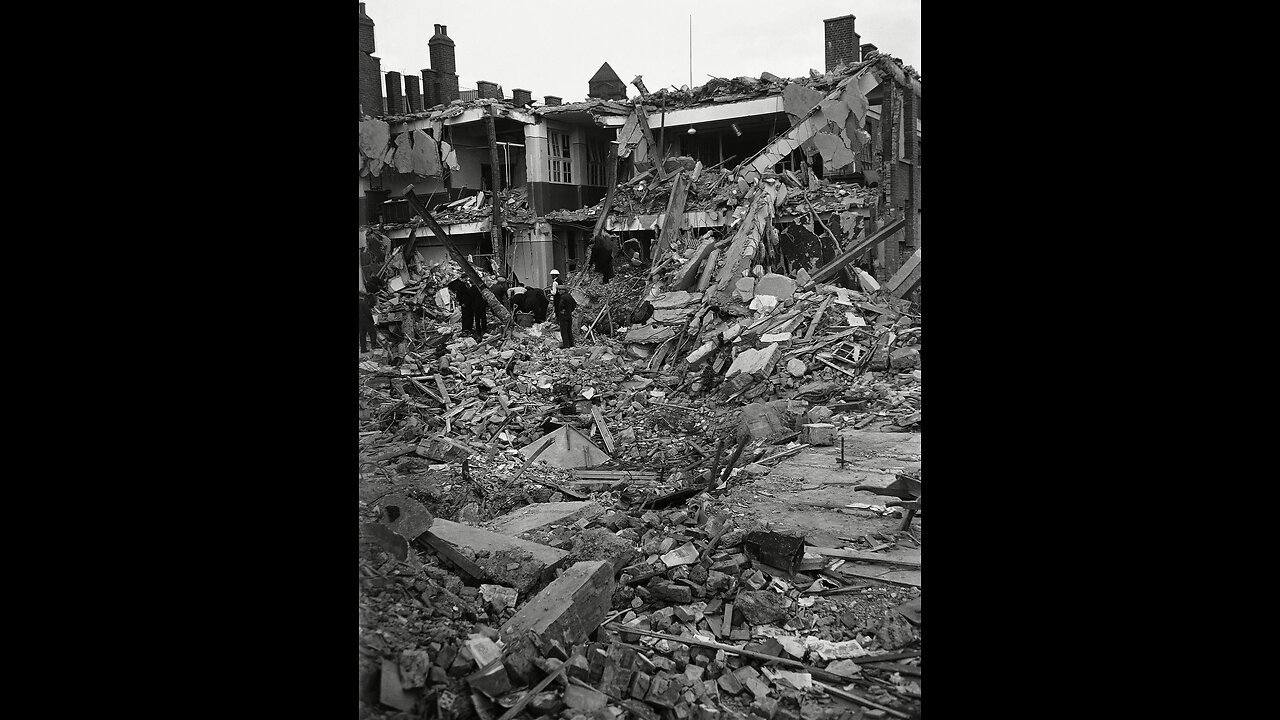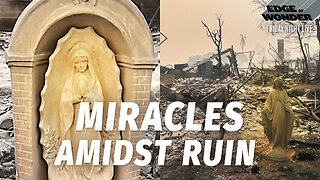Premium Only Content

BOMBING OF HALLSVILLE SCHOOL CANNING TOWN WEST HAM 1940 (BBC "BLITZ" DOCUMENTARY)
Episode one follows a bomb that fell on Martindale Road in the East End of London on the first night of the Blitz. Stan Harris and Norman Pirie were boys in 1940, but their memories of that night are crystal clear.
Initially there was relief as this bomb remained unexploded and Martindale Road residents were evacuated. Sandra Belchamber's grandparents were caught up in the chaos and she explains their decision to leave London and to head for Kent. But Judy Gregory's grandmother, uncle, aunt and cousins put their faith in the authorities and headed to a local school to wait for buses to take them to safety. The buses did not come and they and hundreds of others became a sitting target for returning bombers. One man - journalist Ritchie Calder - tried to warn the authorities that the school was a tragedy waiting to happen, and when the bombers did return they scored a direct hit, killing hundreds.
Judy was moved to tears when she discovered that her family story is outlined in terse civil defence dispatches held in the local archives. An entire branch of her family tree is lost, a tragedy that ironically stemmed from a bomb that didn't go off.
Calder was determined to publicise the human cost of this bomb and those that did go off. His two grandsons explore his mission to explore the real problem London faced in the first weeks of the Blitz; the thousands of people who had lost absolutely everything including their homes. For the first time it was necessary to create city-wide welfare systems that work for everyone. This film explores the work of one exceptional MP who put these systems in place in record time and joined the call for a National Health Service.
Show less
59 minutes
Hundreds of people were sheltering in the school in Agate Street when it took a direct hit at 3.45 a.m. on Tuesday 10th September 1940
Ritchie Calder, a reporter on the now defunct Daily Herald newspaper, described how he had found 'thousands', rather than hundreds, sheltering at South Hallsville.
'From the first glance it seemed to me ominous of disaster. In the passages and classrooms were mothers nursing their babies.
'Whole families were sitting in queues perched on pitiful baggage waiting desperately for coaches to take them away from the terror of the bombs which had been raining down on them.
'These unfortunate people had been told to be ready for the coaches at three o'clock. Hours later the coaches had not arrived. Women were protesting with violence and with tears about the delay.
'Men were cursing the officials who only knew that coaches were expected. "Where are we going?" "Can't we walk there?" "We'll take a bus!" "There's a lorry we can borrow!"
The crowds clamoured for help, for information, for reassurance. But the officials knew no answer other than to offer a cup of tea.
'I knew that Sunday afternoon, that as sure as night would follow day, the bombers would come again with the darkness, and that the school would be bombed.'
And so it was.
'Filled with foreboding', Calder 'hastened back to central London.
'Three times I warned the Whitehall authorities during that evening that the people must be got away before more bombs dropped and certain disaster overtook them.
'Local folk back at the school were making equally frantic efforts to force the local authorities to act.'
But the displaced East Enders were still huddled in the school at 8pm on Monday when the alert sounded.
At 3.45 on the morning of Tuesday, September 10, 'the inevitable bomb' scored a direct hit on South Hallsville School.
Half the building was demolished, and hundreds of tons of masonry crashed down on its occupants.
Rescue workers, frantically digging and scrabbling in the ruins, tried to free the injured, while a cordon was thrown around the area to keep people from seeing what was happening, and the censor warned the Press there were to be no reports or pictures of the tragedy, so devastating would the effect be on the morale of the already shattered population.
-
 1:34:48
1:34:48
Roseanne Barr
11 hours ago $18.71 earnedWe are so F*cking Punk Rock! with Drea de Matteo | The Roseanne Barr Podcast #83
76.3K46 -
 1:08:20
1:08:20
Man in America
12 hours ago🇨🇳 RedNote: A CCP Trojan Horse Deceiving Americans? w/ Levi Browde
35.1K32 -
 3:55:11
3:55:11
I_Came_With_Fire_Podcast
15 hours agoTrump SABOTAGE, LA FIRE CHIEF SUED, and BIDEN’S LAST F-U!
21.8K7 -
 2:59:47
2:59:47
Joker Effect
6 hours agoUkraine in a video game? Hardest thing I have done. S.T.A.L.K.E.R.2 Heart of Chornobyl,
80K4 -
 1:15:22
1:15:22
Flyover Conservatives
1 day agoEczema, Brain Fog, B.O., and Gas… Eating Steak and Butter Creates Ultimate Health Hack - Bella, Steak and Butter Gal | FOC Show
61.3K3 -
 51:58
51:58
PMG
10 hours ago $2.41 earned"Can the Government Learn from Elon Musk’s 70% Labor Cut? A Deep Dive into Inefficient Agencies"
42.9K1 -
 6:39:15
6:39:15
Amish Zaku
10 hours agoRumble Spartans #10 - New Year New Maps
37.4K2 -
 1:04:58
1:04:58
In The Litter Box w/ Jewels & Catturd
1 day agoNo Tax On Tips! | In the Litter Box w/ Jewels & Catturd – Ep. 722 – 1/17/2025
155K32 -
 5:35:39
5:35:39
Dr Disrespect
16 hours ago🔴LIVE - DR DISRESPECT - WARZONE - CRAZY CHALLENGES
175K34 -
 1:16:30
1:16:30
Edge of Wonder
12 hours agoLA Fire Updates: Miracles Amidst the Devastation
48.7K14